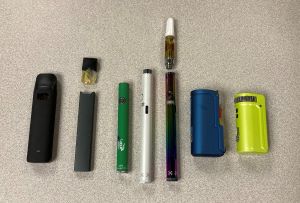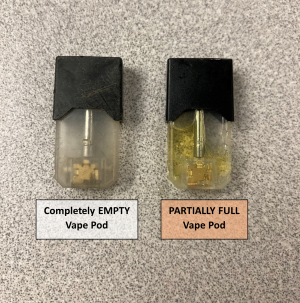
E-Cigarettes and Vape Devices
Electronic cigarettes, vaping devices and e-liquid or “vape juice” can present a significant risk to human health and the environment if improperly disposed of, including risk of fires. Vapes can look like a cigarette, cigar, smoking pipe, a flash drive, smartwatch, or asthma inhaler. Some vapes are designed to be taken apart so that each individual component can be managed properly.
Do not crush or disassemble a vaping device that is not designed to be taken apart!
Do not put vapes in the trash!
Do not put vapes in water!

Disposal options for e-cigarette/vape components
Battery – Some vapes are rechargeable and refillable for long-term use; others are disposable after short-term use. Rechargeable, lithium-ion batteries should never be put in the trash. If the battery can be removed, tape the ends with non-conducting tape (electrical, packaging, or duct tape) and bring it to a household hazardous waste (HHW) collection event or permanent facility for safe disposal.
Cartridge containers/vials; “Pods” – Cartridges hold vape juice that may contain nicotine. Nicotine is an acute hazardous waste! After removing the battery, safely dispose of vape cartridges at HHW collection event or permanent facility.
- Never dump nicotine down the drain.
- Empty cartridge containers or “pods” may be put in the trash.
Heating coils (if applicable) – Metal and ceramic heating coils can be disposed in the regular trash.

Safe storage best management practices
✓ Always wear safety equipment (gloves, apron, and eye protection) when handling damaged vaping devices. Liquid nicotine is very toxic and should not come in contact with the skin or face. Damaged batteries can burn your skin!
✓ Put swollen or damaged vapes in a watertight storage container such as a plastic (polyethylene) pail or bin. Add sand, kitty litter, vermiculite or another fire containment material to aid in safe storage. Damaged batteries are more likely to cause a fire!
✓ Avoid stockpiling vapes. Dispose of them as soon as possible at a HHW collection event or permanent facility.
- NHDES Resources for Managing Vape Devices
- Fact Sheet HW-38: Hazardous Waste Pharmaceuticals Rule: Applicability and Resulting Generator Category
- U.S FDA Tips & Best Practices for Safe Disposal
- U.S FDA E-Cigarettes, Vapes, and other Electronic Nicotine Delivery Systems (ENDS)
- Watch Webinar: Properly Managing E-Cigarettes & Vaping Waste Streams
Questions?
Households and municipal solid waste facilities should contact your local HHW service provider or the NHDES HHW Program by email at hhw@des.nh.gov or by phone (603) 271-2047 to discuss safe disposal options.
Businesses, schools, vape shops, manufacturers, health care facilities, and other non-household generators should contact the NHDES Hazardous Waste Management Bureau by phone at (603) 271-2942 or by email at hwcomp@des.nh.gov.
Visit our Managing My Waste page to learn about other types of household waste.




